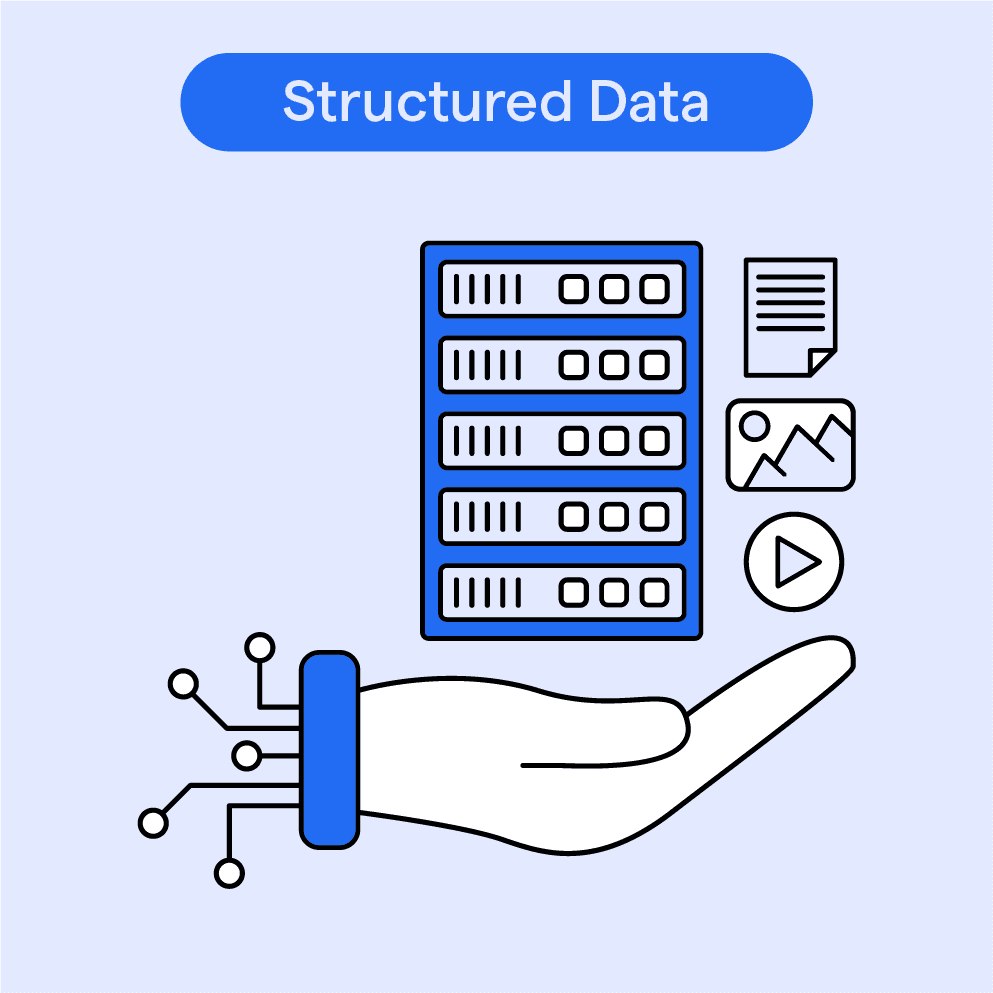What is Structured Data?
Structured data is a method of organizing and presenting data on the web in a structured format that search engines can easily understand. It provides context and additional information about the content of a webpage. In the realm of SEO (Search Engine Optimization), structured data plays a vital role in improving search engine visibility, enhancing search results, boosting click-through rates, and delivering a better user experience.
Why Structured Data Matters?

Enhanced Search Engine Visibility
Structured data helps search engines better understand the content on a webpage, enabling them to display more relevant search results to users. By implementing structured data, you increase the chances of your website appearing in search engine listings, driving more organic traffic to your site.
Richer Search Engine Results
Structured data allows you to provide additional information to search engines, which can be displayed in search results as rich snippets. Rich snippets include elements like star ratings, reviews, images, pricing information, and more. By incorporating structured data, you can make your search listings more visually appealing and informative, attracting more attention from users.
Improved Click-through Rates
When your search listings include rich snippets with relevant and enticing information, they stand out from the crowd. This can lead to higher click-through rates, as users are more likely to click on results that offer more detailed and valuable information right on the search engine results page.
Better User Experience
Structured data helps improve the overall user experience by providing search engines with specific details about your content. This enables search engines to deliver more accurate and relevant results to users. When users find what they're looking for quickly and easily, they are more likely to have a positive experience on your website, leading to increased engagement and conversions.
Benefits of Structured Data for Different Content Types
E-commerce Websites
For e-commerce websites, structured data helps display product details, prices, availability, and reviews directly in search results. This increases visibility, improves user experience, and boosts click-through rates, ultimately leading to higher conversions and sales.
News and Blog Articles
Structured data for news and blog articles allows search engines to present relevant details such as headlines, authors, publication dates, and article summaries in search results. This makes it easier for users to discover and engage with content, increasing traffic and readership.
Local Businesses
Structured data for local businesses enables search engines to display accurate information, such as addresses, phone numbers, and customer reviews, in local search results. This helps users find and choose local businesses, driving foot traffic and increasing conversions.
Events and Performances
Implementing structured data for events and performances helps search engines present details like event names, dates, times, locations, and ticket availability. This enhances the visibility and discoverability of events, attracting more attendees and driving ticket sales.
What is Schema Markup?
Schema markup is a specific vocabulary or code language used to implement structured data on web pages. It provides a standardized way to mark up content and provide context to search engines. Schema markup uses a collection of tags, or "schemas," to describe different types of information and their relationships.
How Schema Markup Works
Schema markup is added to the HTML code of a webpage, allowing search engines to interpret and understand the structured data. By using schema.org vocabulary, which is recognized by major search engines like Google, Bing, and Yahoo, you can define the specific properties and attributes of your content.
Benefits of Implementing Schema Markup
Implementing schema markup offers several benefits, including improved search engine visibility, enhanced search results, and better user engagement. It provides search engines with a clear understanding of your content, resulting in more accurate indexing and higher visibility in search results. Additionally, schema markup enables the creation of rich snippets, increasing the likelihood of attracting clicks and driving traffic to your website.
Types of Structured Data

Product Markup
Product markup is used for e-commerce websites to provide detailed information about individual products, such as pricing, availability, reviews, and specifications. It helps search engines display rich product information in search results, making it easier for users to compare and make purchasing decisions.
Article Markup
Article markup is used to define structured data for news articles, blog posts, and other content-based pages. It provides information about the headline, author, publication date, and article body, enabling search engines to present richer search results and facilitate the discovery of relevant content.
Event Markup
Event markup is used to describe events such as concerts, conferences, or sporting events. It includes details such as event name, date, time, location, and ticket availability. By implementing event markup, search engines can display event-specific information, making it easier for users to find and engage with upcoming events.
Local Business Markup
Local business markup provides structured data about a specific business, including its name, address, phone number, opening hours, and customer reviews. This markup helps search engines understand local business information and present it accurately in search results, particularly in local search queries.
Review Markup
Review markup allows you to provide structured data about customer reviews and ratings for products, services, businesses, and other entities. It helps search engines display star ratings, review snippets, and review counts in search results, building trust and influencing users' decisions.
How to Implement Structured Data?
HTML Microdata
HTML microdata is one of the three methods for implementing structured data. It involves adding specific HTML attributes to elements within the webpage's code. Microdata uses the "itemtype," "itemprop," and "itemscope" attributes to define the schema type, properties, and scope of the structured data.
JSON-LD
JSON-LD (JavaScript Object Notation for Linked Data) is another method for implementing structured data. It uses a JavaScript-based format to embed structured data within the webpage's code. JSON-LD is considered more user-friendly and easier to implement than other methods, as it keeps the structured data separate from the main content.
RDFa
RDFa (Resource Description Framework in Attributes) is the third method for implementing structured data. It allows you to embed structured data using HTML attributes that have specific meanings in the RDFa vocabulary. RDFa provides a way to express relationships between different pieces of data and is particularly useful for complex or interconnected data structures.
Popular Structured Data Formats

JSON-LD
JSON-LD is a popular structured data format that uses the JSON format to define and represent structured data. It is widely supported by search engines and offers a clean and flexible way to incorporate structured data into web pages.
Microdata
Microdata is an HTML-based structured data format that uses specific attributes to mark up content on web pages. It is relatively easy to implement and is supported by major search engines.
RDFa
RDFa is an HTML-based structured data format that allows you to embed structured data using specific attributes. It provides a way to express complex relationships between different data elements and is widely supported by search engines.
Testing and Validating Structured Data
Google Structured Data Testing Tool
The Google Structured Data Testing Tool allows you to test and validate the implementation of structured data on your web pages. It helps you identify errors, missing fields, or incorrect syntax, ensuring that your structured data is correctly interpreted by search engines.
Structured Data Markup Helper
The Structured Data Markup Helper, provided by Google, assists in generating structured data code for your web pages. It guides you through the process of tagging different elements and content types, making it easier to implement structured data effectively.
Common Structured Data Errors
Missing Required Fields
One common error in structured data implementation is failing to include all the required fields according to the selected schema type. Search engines rely on these fields to understand and display the structured data correctly, so it's essential to provide all the necessary information.
Incorrect Syntax
Incorrectly formatted or invalid syntax can lead to structured data errors. It's crucial to follow the syntax guidelines provided by the chosen structured data format and to double-check your code for any syntax mistakes.
Invalid Values
Providing incorrect or invalid values for structured data fields can result in errors. Make sure to use accurate and relevant information that adheres to the specified data types and formats for each field.
Structured Data Best Practices

Follow Schema.org Guidelines
Schema.org is a collaborative initiative by major search engines to provide a comprehensive schema vocabulary. It's important to consult the official Schema.org documentation and follow their guidelines to ensure proper implementation and adherence to recognized schema types.
Use Appropriate Schema Types
Selecting the most appropriate schema types for your content is crucial. Use schema types that align with the nature of your content, such as articles, products, events, or local businesses. This ensures that search engines understand and present your content correctly.
Include Relevant and Accurate Data
Provide accurate and up-to-date information in your structured data. Including relevant details such as titles, descriptions, prices, dates, and locations enhances the accuracy and relevance of search results, improving the overall user experience.
Frequently Asked Questions (FAQs)
What is Structured Data?
Structured data refers to organized information that follows a predefined schema, making it easily searchable, analyzable, and processed by computers.
What is Big Data and how is it different from Structured Data?
Structured data refers to information organized in a predefined format, such as tables in a relational database. In contrast, Big Data often includes unstructured or semi-structured data like text, images, and videos, which require specialized tools and techniques for analysis.
How does Structured Data differ from Unstructured Data?
Structured data has a consistent format and organization, while unstructured data lacks a specific structure, making it harder to analyze.
What are examples of Structured Data?
Examples include spreadsheets, databases, and CSV files containing information like names, addresses, and product details.
Why is Structured Data important?
Structured data enables efficient data analysis, search engine optimization, and machine learning applications, improving business insights and decision-making.
How can businesses convert unstructured data into Structured Data?
Businesses can use data extraction tools, natural language processing, and text analytics to transform unstructured data into structured formats for analysis.

